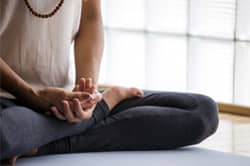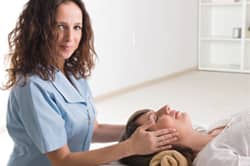Holistic Drug Rehab Centers

In a 2009 survey published in Pastoral Psychology, 33% of rehab centers reported using some form of holistic addiction treatment in their programs.1
Treatment centers use many different types of holistic practices and therapies, such as yoga, meditation, acupuncture, and nutritional therapies. Both inpatient and outpatient recovery facilities may offer this type of treatment, and they will usually combine it with a variety of more traditional treatments, such as individual counseling, group therapy, family therapy, detox, and medically assisted treatment.
Holistic programs appeal to people seeking alternative treatments as well as those who wish to address the impacts of their addiction on all levels—mind, body, and spirit.
![]() To learn more about holistic drug rehab centers near you, call our drug and alcohol treatment helpline at 1-888-968-9816
Who Answers?
.
To learn more about holistic drug rehab centers near you, call our drug and alcohol treatment helpline at 1-888-968-9816
Who Answers?
.
What Is a Holistic Addiction Treatment Program?
Holistic substance abuse treatment programs consist of a variety of complementary and alternative treatments that address the whole person through unique mind-body-spirit approaches. Holistic treatments may be used to treat drug addiction and alcoholism as well as other mental health disorders, such as anxiety, depression, and post-traumatic stress disorder.
Holistic Therapies

Alternative addiction treatment may be used for mental health issues related to addiction such as depression and stress; physical aspects such as drug cravings, withdrawal, and poor nutrition; and spiritual issues such as lack of meaning and purpose in life. Some common treatments available at holistic drug rehab centers include the following:
- Acupuncture: Acupuncture is a form of traditional Chinese medicine where an acupuncturist stimulates certain pressure points in the body by inserting thin needles into the skin. Acupuncture is said to help ease withdrawal symptoms and help the body restore balance as well as potentially calm emotional symptoms.
- Yoga: Many people think of yoga as just another form of exercise, like Pilates or Zumba. But yoga is an ancient Indian practice that might benefit addiction recovery by relieving stress, easing physical withdrawal symptoms, and providing a healthy outlet to cope with triggers, as well as a natural high.
- Meditation: A variety of different meditation techniques may be used in addiction recovery. Some find that mediation helps them to be more present in the moment, decrease stress, cultivate self-awareness, resolve negative emotions, ease cravings, and cope with triggers for relapse.
- Reiki: Reiki is a Japanese healing practice that consists of working with one’s energy and life force (also known as chi or Ki) through a practice called palm healing, in which the Reiki practitioner transfers energy to the patient through the palms. Reiki is thought to help with addiction by relieving stress, reducing the severity of withdrawal symptoms, and promoting healthy self-esteem and emotional well-being.
- Tai chi: Tai chi is an ancient Chinese martial arts practice often referred to as “meditation in motion.” This meditative exercise consists of slow, gentle body movements that help relax the mind and body and promote serenity. Tai chi is said to help aid in addiction recovery by relieving stress and promoting overall well-being and balance of the mind and body.
- Massage: Massage is often used as a complementary addiction treatment as it helps release endorphins naturally, which promotes physical relaxation and reduces emotional stress. Massage may be especially beneficial during the withdrawal process as certain techniques can aid the body in its detox process.
- Nutritional therapy: Many holistic addiction treatment centers provide nutritional counseling. Proper nutrition can help restore balance in the body by correcting vitamin and mineral deficits that may have accumulated over the course of prolonged substance abuse. Such nutritional deficiencies affect the body, of course, but they can also play a role in anxiety, depression, and other mental health issues.
- Biofeedback: Biofeedback consists of using special instruments to measure physiological processes such as brain waves, breathing, heart rate, skin temperature, and muscle activity. Biofeedback can help patients gain better control over their minds and bodies and is thought to decrease the severity of withdrawal symptoms as well as help people overcome depression and anxiety.
In addition to alternative therapies, many holistic rehabilitation centers also offer traditional drug and alcohol treatments, such as the following:
- Individual and group counseling.
- Family therapy.
- Medication management.
- Medically assisted detox.
- Physical activity.
- 12-step meetings.
- Aftercare planning.
![]() Would you like to learn more about alternative substance abuse recovery programs? Contact one of our helpline representatives today at 1-888-968-9816
Who Answers?
.
Would you like to learn more about alternative substance abuse recovery programs? Contact one of our helpline representatives today at 1-888-968-9816
Who Answers?
.
Other Things to Consider

In addition to the types of therapies and treatments offered, you should consider other factors when choosing to attend a recovery facility. These include:
- Cost of treatment: Drug rehab can be expensive. Make sure the program you choose is affordable for you. Consider shopping around to find the best priced program that meets your unique needs.
- Insurance coverage: If you’re insured, check with your insurance company to determine what coverage you have for addiction treatment. Some insurance plans may not cover any holistic therapies, whereas others may cover only some. If your insurance does not cover the program, you will be responsible for the expenses.
- Inpatient or outpatient treatment: Inpatient treatment is more intensive and requires that the patient reside in the facility 24/7 for a specified number of days, usually at least 30. Outpatient treatment takes place on a part-time basis while the patient continues to reside at home. Inpatient treatment is best suited for those with severe addictions who need to focus exclusively on recovering from addiction. Outpatient treatment may be preferred by those with less severe addictions who would like to keep working, stay enrolled in school, or otherwise remain engaged in commitments outside of the treatment environment.
- Qualifications of staff: Traditional treatment centers typically have a well-rounded staff of licensed physicians, nurses, psychiatrists, psychologists, and counselors. The staff at holistic rehab clinics could vary considerably depending on the types of treatment they provide. Consider the qualifications of their staff. What licenses, certifications, education, and training do they have? How much experience do they have treating drug addiction and alcoholism?
- Efficacy of treatment: Currently, little research is available on holistic addiction therapies and their outcomes, so it is difficult to determine whether these treatments are actually effective. If you cannot find evidence-based research, consider anecdotal evidence and talk to others who have received the treatments to learn about their experiences. You may also consider asking the treatment center for success rates or other statistics. Regardless of what information you find, you may want to seek out a treatment center that provides both traditional and holistic treatments to maximize your chances of making a full and long-term recovery.
- Detox methods: Consider the detox methods offered at the treatment center. Holistic drug rehab centers may not provide traditional pharmaceutical treatments for drug detox. Instead, they may use natural means of detoxing through nutritional cleansing, juice fasting, wise eating, and supplementation through, for example, dandelion root, garlic, and seaweed.
- Other aspects of the program: Consider all other aspects of the recovery program such as the location of the facility, services and amenities provided, and online reviews and testimonials of the clinic and its staff. Be sure to choose a treatment center that matches your unique needs.
Get informed about your options and choose a treatment center that is best aligned with your individual beliefs and values. The more informed you are about the facility, the more confident you will feel in your quality of care and treatment. To learn more about holistic drug rehab clinics, call our addiction recovery hotline at 1-888-968-9816 Who Answers? .
Sources
- Priester, P., Scherer, J., et al. (2009). The Frequency of Prayer, Meditation, and Holistic Interventions in Addiction Treatment: A National Survey. Pastoral Psychology, 58: 315.
